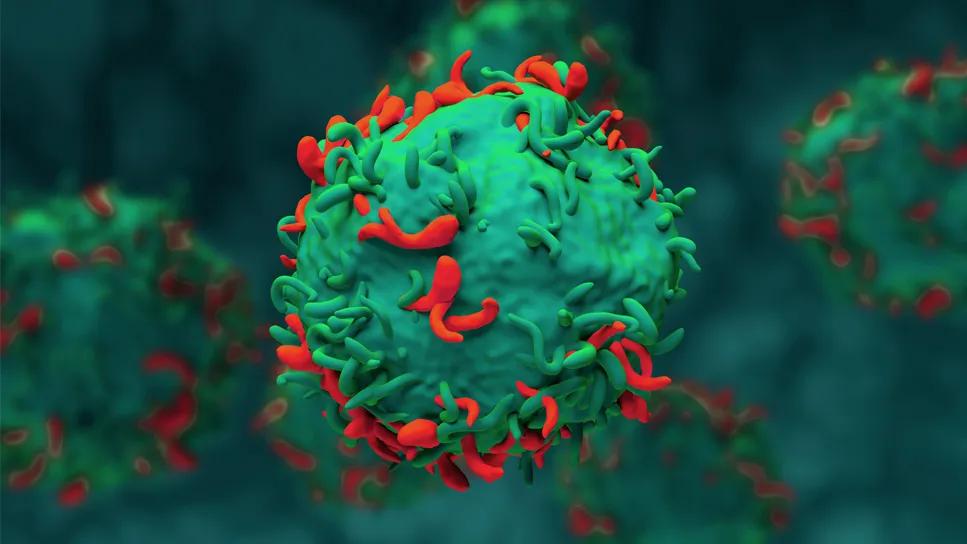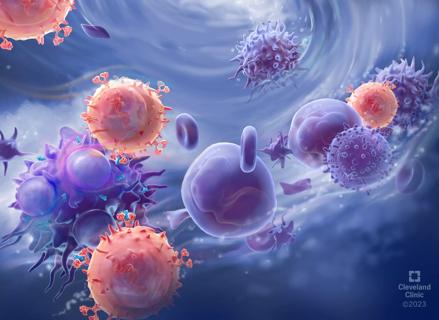Early results show patients experiencing deep and complete response

For the first time, researchers in the U.S. have been able to study the use of CAR T-cell therapy for patients with relapsed/refractory (R/R) AL amyloidosis.
Advertisement
Cleveland Clinic is a non-profit academic medical center. Advertising on our site helps support our mission. We do not endorse non-Cleveland Clinic products or services. Policy
The early findings have been promising. Initial results from the Nexicart-2 study suggest that the CAR T-cell product Nexicart NXC-201 can be administered safely and effectively to patients with relapsed/refractory AL amyloidosis. To date, no hematologic relapses or progression has been observed.
The early data was presented with much interest at the 2025 ASCO Annual Meeting.
“AL amyloidosis has historically been tough to diagnose and tough to treat,” says study co-author Shahzad Raza, MD, a hematologist/oncologist with Cleveland Clinic Cancer Institute. “Patient often present with multiple complex problems, including heart, kidney or liver failure.”
First-line treatment is commonly immunotherapy (daratumumab) and the proteasome inhibitor bortezomib, along with cyclophosphamide chemotherapy. Those who have suboptimal responses undergo autologous stem cell transplant. However, some patients have poor outcomes. To date, there are no FDA-approved treatments for relapsed disease.
Patients were eligible for the Nexicart-2 trial if they previously received bortezomib and an anti-CD38 antibody therapy and had a suboptimal responses. NXC-201 is sterically-optimized BCMA-targeted CAR-T cell therapy with a “digital filter” that filters out non-specific activation. The study is expected to enroll 40 patients at leading U.S. sites, including Cleveland Clinic.
An updated analysis of 10 patients was presented at the 2025 ASCO annual meeting. Patients in the trial received a median of four lines of therapy prior to receiving NXC-201. All patients had baseline relapsed/refractory AL amyloidosis. Patient enrolled in this study have cardiac, renal, GI and nerve involvement.
Advertisement
In this single-arm, multi-site, phase 1b trial, patients received an autologous BCMA-targeted CAR T-cell therapy called Nexicart NXC-201. All patients received treatment with a vein-to-vein time of 14 days. This is a much faster manufacturing process than typical CAR T-cell products, which can take upwards of two months to produce.
Three patients received 150 million CAR-T cells and seven patients received 450 million CAR-T cells. The average length of hospitalization was seven days. Median follow-up was 97 days.
After NXC-201 treatment, all patients achieved a rapid and deep hematologic responses. On day 7, complete responses (CRs) were observed in 70% (7 out of 10) of patients treated with NXC-201. The remaining three patients are bone marrow minimum residual disease (MRD) negative (10-6).There have been no relapses recorded to-date and no safety signals identified. No neurotoxicity has been observed. Only low-grade cytokine release syndrome has been observed.
At day +25, 8/9 evaluable patients had MRD negative (10-6). As of the data cutoff, no relapses have been reported. Organ responses, including cardiac and renal, were observed in 4/5 evaluable patients.
“For the first time, we’ve been able to see how CAR T-cell therapy can be used to treat patients with relapsed or refractory AL amyloidosis,” says Dr. Raza, who is the study PI at Cleveland Clinic. “This early-phase study demonstrates that CAR T-cell therapy can be safely given to these patients.”
Interestingly, NXC-20 has shown far fewer side effects than other CAR T-cell products, Dr. Raza noted. So far, no neurotoxicity of any kind is noted in the study. Low-grade cytokine release syndrome has been a predictable and manageable side effect, occurring within the first 72 hours after CAR T-cell infusion.
Advertisement
This multi-site study brought together hematology experts at leading cancer institutes around the country, working toward a shared goal of transforming the lives of people with this challenging disease.
Additionally, much collaboration was needed within the institutes to care for patients with complex medical needs. The cardiology team at Cleveland Clinic Cancer Institute monitors study patients closely on telemetry while they’re in the hospital. “I’d like to recognize our colleagues, including cardiac amyloidosis expert Dr. Carmona-Rubio, who is working with us closely on this trial,” says Dr. Raza. “He has been actively engaged in the study parameters and protocols. The coordination of care is very important for patients with multiple medical conditions.”
This early phase 1b/2a is expected to enroll 40 patients across the US. The study is currently open at Cleveland Clinic Cancer Institute.
Advertisement
Advertisement

Model shows promise in differentiating from hypertrophic cardiomyopathy and other conditions

Multi-specialty coordination essential for improving quality of life

On-demand stem cell mobilizer is an effective salvage strategy

Age alone should not rule out patients from potentially curative treatment

Offers a new option for patients 60 and older with relapsed/refractory disease

Higher type 2 immunity observed in persistent CAR T cells

Real-world study shows high response rates that are durable with commercial lisocabtagene maraleucel

Advancements lead to a new trial involving autoimmune disease